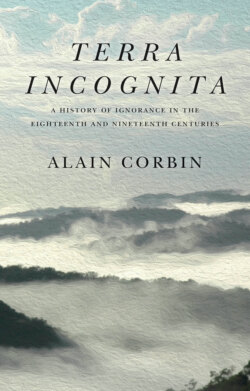Terra Incognita

Реклама. ООО «ЛитРес», ИНН: 7719571260.
Оглавление
Alain Corbin. Terra Incognita
CONTENTS
Guide
Pages
Terra Incognita. A History of Ignorance in the Eighteenth and Nineteenth Centuries
Acknowledgements
A Comprehensive History Implies the Study of Ignorance
NOTES
1 The Great Lisbon Earthquake of 1755
NOTES
2 The Age of the Earth?
NOTES
3 Imagining the Earth’s Internal Structure
NOTES
4 The Mystery of the Poles
NOTES
5 The Unfathomable Mysteries of the Deep
NOTES
6 Discovering Mountains
NOTES
7 Mysterious Glaciers
NOTES
8 A Fascination with Volcanoes
NOTES
9 The Birth of Meteorology
NOTES
10 Conquering the Skies
11 The State of Scientific Ignorance at the End of the Age of Enlightenment
Part II A GRADUAL DECLINE IN IGNORANCE (1800–1850)
12 Understanding Glaciers
NOTES
13 The Birth of Geology
NOTES
14 Volcanoes and the Mystery of ‘Dry Fogs’
NOTES
15 The Ocean Depths and the Fear of the Unknown
NOTES
16 Reading Clouds and the Beaufort Scale
NOTES
17 The Poles Remain a Mystery
NOTES
18 The State of Scientific Ignorance in the Early 1860s
19 Exploring the Ocean Depths
NOTES
20 The Development of Dynamic Meteorology
NOTES
21 Manned Flight and the Discovery of the Troposphere and Stratosphere
NOTES
22 Scientific Volcanology and the Birth of Seismology
NOTES
23 Measuring the Grip of Ice
NOTES
24 Solving the Mysteries of Rivers: Fluvialism, Hydrology and Speleology
NOTES
25 A New Approach to Reading the Globe
NOTES
26 Was There Open Sea at the Poles?
NOTES
27 The Earth Sciences Slowly Filter into General Knowledge
NOTES
28 Measuring Ignorance at the Dawn of the Twentieth Century
Index. A
B
C
D
E
F
G
H
I
J
K
L
M
N
O
P
Q
R
S
T
U
V
W
Z
POLITY END USER LICENSE AGREEMENT
Отрывок из книги
Alain Corbin
Translated by Susan Pickford
.....
The reason why I am sharing this anecdote is because it is significant. The headmaster had, quite unwittingly, swept us into the Anthropocene era by teaching us that man was a terrible threat to what we call our planet.
In my mind, however, it was not as simple as that. We were not allowed to talk at the school refectory. While we ate, one of the older pupils would read aloud from a book, and I would always listen attentively. I remember being particularly struck by three readings in the course of the years 1946 to 1948. The first was René Caillié’s narrative of his travels from 1824 to 1828 to Timbuktu, in the dark heart of Africa, full of slaves but not cannibals. The second, which obsessed me for a while, was about the notebooks found on Captain Scott’s body after he tragically perished on his way back from his failed attempt to be the first man to reach the South Pole. Two years later, the older boys read aloud Jules Verne’s Île mystérieuse [Mysterious Island] – and by then I was one of the older boys myself. In short, while the headmaster was ushering us into the Anthropocene era, the books read to us to furnish our imaginations dated from a time when the earth was much more mysterious and frightening, and very different from the earth we were learning about in the immediate aftermath of the Second World War. In my case, the chasm widened yet further as I eagerly devoured many more of Jules Verne’s novels.
.....